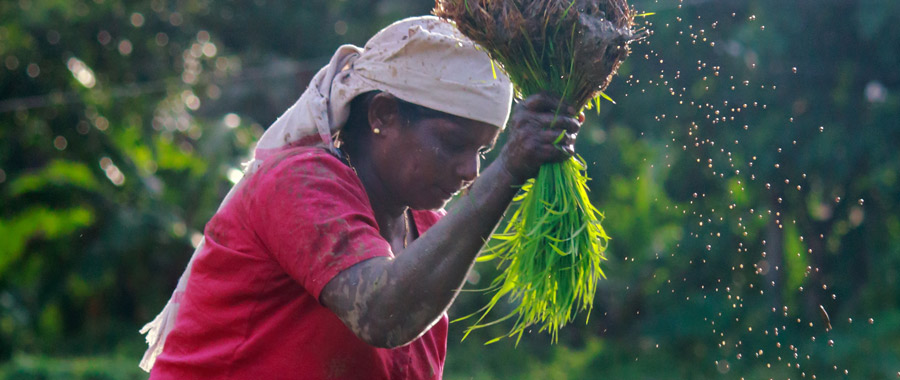The principle of development, particularly in the context of socio-economic progress, can often seem elusive and fraught with complexities. However, the Bahá’í teachings provide a transformative and grounded perspective: “If all development begins with the farmer, we should too.” This notion is not merely a catchy adage but a clarion call to recognize the foundational role that agriculture and rural development play in the tapestry of human advancement. This article unravels this principle’s multifaceted implications, encouraging a shift in perspective toward development that emphasizes sustainability, inclusivity, and community empowerment.
To comprehend the essence of this teaching, one must first appreciate the crucial position held by farmers in any economy. Farmers are not mere laborers; they are custodians of the soil, stewards of biodiversity, and pivotal actors in ensuring food security. When development initiatives begin at the grassroots level—with an unwavering focus on the farmer—there emerges a rich soil from which holistic growth can flourish. The nuances of this perspective can lead to innovative approaches to development that prioritize local knowledge, sustainable practices, and equitable resource distribution.
To illustrate this principle more concretely, consider the common narrative surrounding agricultural development. Much of contemporary agricultural policy tends to adopt a top-down approach, where decisions are made in distant corporate boardrooms or government offices, often divorced from the realities faced by local farmers. In stark contrast, the Bahá’í teachings advocate for an approach rooted in participatory development. This methodology necessitates active collaboration with farmers—integrating their practical wisdom and lived experiences into the decision-making processes that affect their livelihoods.
The implications of prioritizing farmers extend beyond their immediate economic circumstances. Such a paradigm recognizes the intrinsic connection between agriculture, community wellbeing, and environmental stewardship. As one explores the triadic relationship between farming practices, ecological balance, and social equity, it becomes evident that empowering farmers can catalyze significant transformations across various dimensions of society. This empowerment can manifest in myriad forms: from access to education and training, to financial resources, and even legislative support that protects the rights of smallholder farmers.
Moreover, an inclusive development strategy underscores the importance of gender equity within agricultural practices. Women constitute a substantial proportion of the agricultural workforce globally yet often face systemic barriers that hinder their ability to fully participate and thrive in the sector. Recognizing the contributions of women farmers and investing in their potential can yield transformative outcomes, not only for families but for entire communities. In light of such insights, agricultural development becomes a vehicle for social justice, promising to elevate marginalized voices and foster equitable growth.
The Bahá’í teachings further compel us to consider the ecological dimensions of agricultural development. An approach that begins with the farmer promotes sustainable and regenerative practices that prioritize the health of the soil, the diversity of crops, and the resilience of ecosystems. This focus stands in stark opposition to industrial agricultural models that often emphasize short-term productivity while neglecting long-term viability. By championing environmentally sound techniques—such as permaculture, agroecology, and organic farming—communities can rejuvenate their natural habitats, enhance biodiversity, and ultimately cultivate a more sustainable future.
In addition to the environmental benefits, the emphasis on farmer-led development fosters a culture of innovation and entrepreneurship. As farmers gain agency over their practices and economic futures, they often become catalysts for local innovation, embracing new technologies and practices that align with community needs. This dynamic can lead to the rise of cooperative enterprises, direct-to-consumer models, and localized supply chains that not only enhance food sovereignty but also promote regional economic resilience.
However, realizing the promise of this transformative approach requires a communal commitment, transcending individual or isolated actions. It necessitates the establishment of robust support systems that can empower farmers and facilitate their active participation in local and national dialogues. Policymakers, non-governmental organizations, and community leaders must collaborate to create environments conducive to sustainable agricultural development. Such partnerships can provide access to critical resources—be they financial, technical, or educational—that lay the groundwork for long-lasting change.
In conclusion, the Bahá’í teaching that development should commence with the farmer embodies a profound shift in perspective, urging us to reevaluate our understanding of progress. By recognizing the centrality of farmers in the development narrative, we unlock the potential for sustainable, equitable, and community-driven growth. This paradigm compels us to embrace an integrated approach that acknowledges the interplay between agriculture, social equity, and environmental stewardship. Through this lens, we can cultivate a future that honors the wisdom of those who till the fields and nurtures the potential of every individual to contribute meaningfully to the greater good.
